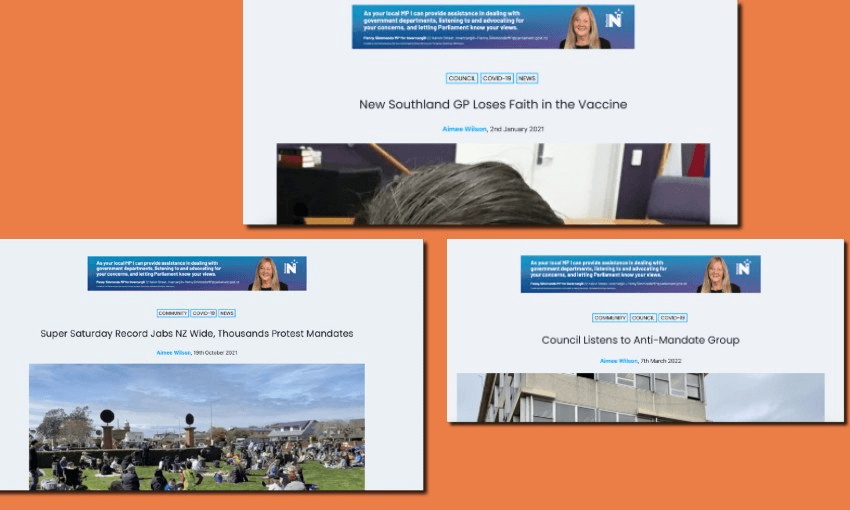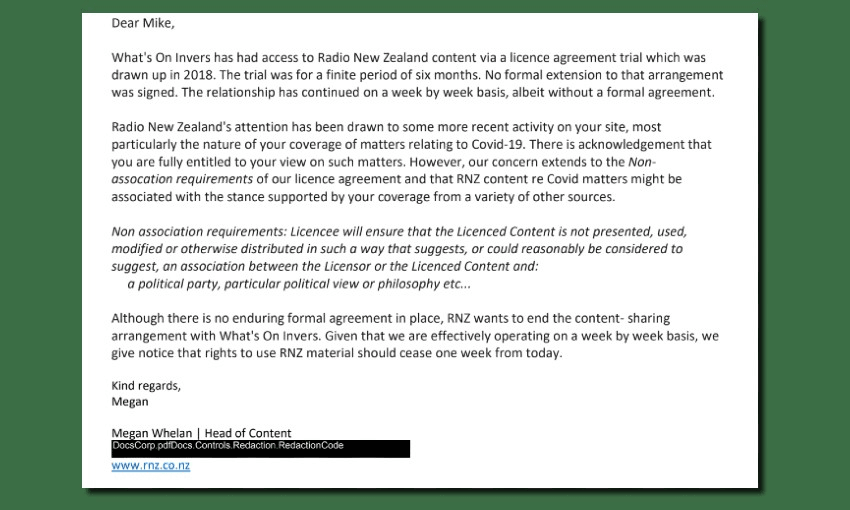National MP advertising on What’s On Invers, the ‘anti-vax’ website blacklisted by RNZ
Prominent adverts for National MP Penny Simmonds appear on What’s On Invers, a self-described news website that lost a content sharing deal with RNZ over its stance on Covid-19 vaccines. Stewart Sowman-Lund reports.
National’s MP for Invercargill is continuing to run prominent adverts on a local independent news website accused of sharing Covid-19 and vaccine misinformation. That’s despite the website, What’s On Invers, being forced to end its content sharing arrangement with national broadcaster RNZ following “concern” over its views regarding the pandemic.
What’s On Invers is a Southland-based Facebook page and self-described news outlet launched almost 10 years ago and now followed by close to 40,000 people. In recent years, it has expanded to include an associated community directory and news website of the same name.
Founded by Mike Sanford, an unsuccessful licensing trust candidate in the recent local elections, What’s On Invers claims to have a bigger readership than mainstream media outlets in the region, such as the Southland Times.
But concerns were raised to The Spinoff earlier this year about content described by critics as “unethical” and “anti-vax” being shared by the website. Throughout the Covid-19 pandemic, articles shared by What’s On Invers appeared to cast doubt on the efficacy of the Pfizer vaccine and regularly sympathised with conspiracy theory groups like Voices for Freedom.
Within several articles published by What’s On Invers, ads for local MP Simmonds can be found running along the top or in the body of the text. While many of the articles boasting ads for Simmonds are innocuous, some blur the line between news and misinformation. The Spinoff found an ad running atop an article about a large Voices for Freedom rally in 2021 that described an “us and them mentality” driven by the government around vaccines. Another ad for Simmonds appeared on a story that quoted an anti-mandate doctor promoting Ivermectin as “one of the most safest drugs in the world”. And one also appeared on an article that quoted a protest group comparing Covid-19 to the flu. At the time of publication, ads for Simmonds were still showing up on the site as part of a rotation alongside promotions for several local businesses.


As well as advertising, Simmonds has used What’s On Invers to publish opinion columns in her capacity as local MP. The most recent of these was shared by the platform in September this year – months after What’s On Invers had started to promote fringe views around the pandemic. Topics canvassed in her columns appear generally in-line with National Party talking points: the cost of living crisis, the amalgamation of polytechnics and the centralisation of the health system. Simmonds has sent out press releases to the media on similar topics.
When approached by The Spinoff, Simmonds chose not to respond to questions regarding her relationship with What’s On Invers. “No comment at this time,” she said. Follow-up emails to Simmonds and her press secretary went unanswered, as did requests for comment to the office of National Party leader Christopher Luxon.
While the views promoted by What’s On Invers may not be enough to dissuade Simmonds from advertising, they were sufficient to see a content sharing deal with RNZ come to an end over a year ago.
The Spinoff can reveal that RNZ cut ties with What’s On Invers specifically over its coverage of Covid-19. Until October last year, What’s On Invers was one of about 60 outlets that had official republication deals with the state-owned broadcaster. That meant it was able to use RNZ-produced content on its website.
However, emails released to The Spinoff under the Official Information Act reveal the precise reason why RNZ decided to end that deal.
RNZ was contacted in October last year by a reader concerned with “anti-vax [and] anti-mask misinformation” being promulgated by What’s On Invers. The reader questioned whether the content could be “putting the health and safety of uninformed readers at risk” and asked whether RNZ was aware that its content was being republished “by arrangement” on the website.
This email made its way to the head of news at RNZ, Richard Sutherland, who suggested an immediate end to the republication deal. “I vote we pull their agreement,” he wrote. “We don’t want to be associated with this kind of bs do we?” Megan Whelan, RNZ’s head of digital content, agreed. “I concur.”
Whelan then contacted What’s On Invers, demanding the outlet cease publication of any RNZ content. “Radio New Zealand’s attention has been drawn to some… recent activity on your site, most particularly the nature of your coverage of matters relating to Covid-19,” the October 2021 email stated. “There is acknowledgement that you are fully entitled to your view on such matters. However, our concern extends to the Non-assocation [sic] requirements of our licence agreement and that RNZ content re Covid matters might be associated with the stance supported by your coverage from a variety of other sources.”
The email continued: “Although there is no enduring formal agreement in place, RNZ wants to end the content- sharing arrangement with What’s On Invers.”


Earlier reporting by The Spinoff revealed that What’s On Invers continued to republish content from RNZ after the end of the agreement, claiming it still had permission. RNZ was unaware of this until The Spinoff’s reporting and a spokesperson confirmed the broadcaster would be contacting the site’s administrator. At the time, the spokesperson wouldn’t disclose why exactly RNZ had chosen to end the content sharing arrangement.
This wasn’t the first time that RNZ had raised concerns with What’s On Invers about the use of republished content. Other emails seen by The Spinoff show that in 2020 What’s On Invers was ordered to amend an “unprofessional” headline it had used on RNZ content about the local acquisition of media company Stuff for $1. What’s On Invers referred to Stuff as “Stuff’d” in the headline, a derogatory title occasionally used by critics of the mainstream media.
“There may be an attempt to argue that a headline is authored separately from a story and should be considered in that light,” an RNZ representative informed What’s On Invers at the time. “We do not accept that and know that many readers will see headlines and related stories as coming from the same source.”
Sanford, in response, told RNZ: “This will not happen again.”
It appears that What’s On Invers has not republished any RNZ content since The Spinoff’s original report in October this year, however articles published after the supposed end of the content sharing arrangement the year prior remain visible on the site.
Update: Following publication, The Spinoff received a written statement from a spokesperson for National Party leader Christopher Luxon. “Placing advertisements or opinion pieces with any publication does not imply agreement with everything it says.” Read more here.
Know more? Contact stewart@thespinoff.co.nz


